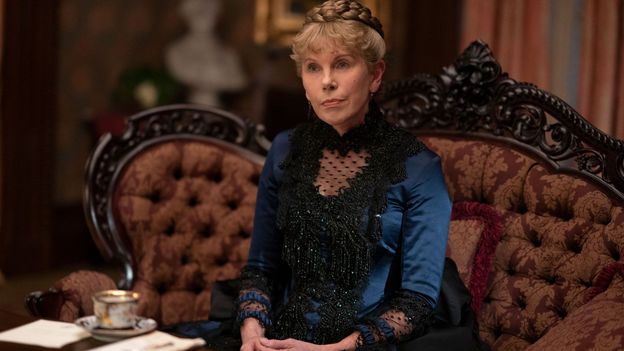HBO’s new period epic is a delight


Marian is placed at the centre of the plot. As the series starts, her father has died, leaving her with a mere $30, so she moves to New York to live with her aunts. But her down-to-earth, sensible character is so pallid next to the vividly-drawn women around her that this ostensible heroine hardly registers.
Fortunately, she is befriended by a galvanizing figure, Peggy Scott, a poised young black woman who helps Marian when her purse is stolen. Denée Benton plays her beautifully, with subtly displayed passion. An aspiring writer, Peggy becomes Mrs Van Rhijn’s secretary and moves into the household. She also allows Fellowes to address the issue of race, so often ignored in historical fiction. Peggy belongs to the middle class, but even Marian makes glib assumptions, thinking she must be in need of charity. Audra McDonald, as Peggy’s concerned mother, wants her to return to their comfortable home, but Peggy has ideas of her own, as well as a secret in her past that is still hidden from us at the end of the five episodes made available for review.
The Gilded Age doesn’t deny the obstacles Peggy faces: while she is a talented writer, a publisher asks her not to disclose her race so as not to offend white readers. But the show sometimes minimises her problems. It seems so unlikely that Agnes, or anyone of her class at the time, would hire a black secretary that a clumsy bit of dialogue forces in an explanation: she admires people like Peggy who help themselves. Her butler, Bannister (Simon Jones), is totally egalitarian and welcoming. One of his kitchen maids, however, worries about using the same bathroom as Peggy, a racist attitude that seems more realistic for the period.
Apart from Peggy, the downstairs characters are less defined than those upstairs. But even when the characters are wobbly, the show is a delight to watch, always engaging. There is a lawyer who falls in love with Marian, as well as a gay character scheming to marry his own dollar princess, and the Russells’ teenage daughter, Gladys (Taissa Farmiga), bristling at her mother’s strictness. Historical figures float in and out, including Clara Barton (Linda Emond), who is starting the American Red Cross and needs wealthy donors like Bertha. And no one writes sharp-tongued dialogue like Fellowes. When Marian tells her aunt that she plans to visit a friend in Brooklyn who needs cheering up, Agnes says, “So should I if I lived in Brooklyn”. That line is especially droll, given how trendy Brooklyn has become today.
The Gilded Age captures all the glamour, extravagance and snobbery of a period now safely at a distance. The nouveaux riches are still with us, of course, but today they are likely to be tech billionaires, judged on whether they create philanthropic foundations, as Bill Gates did, or use ther fortunes to propel themselves into space like Jeff Bezos. Then and now, their stories are a reminder that when Mark Twain created the phrase The Gilded Age, he was mordantly pointing out the period’s surface glitter, not its gold.
★★★★☆
The Gilded Age premieres on 24 January on HBO and HBO Max in the US and 25 January on Sky Atlantic and Now in the UK
Love film and TV? Join BBC Culture Film and TV Club on Facebook, a community for cinephiles all over the world.
If you would like to comment on this story or anything else you have seen on BBC Culture, head over to our Facebook page or message us on Twitter.
And if you liked this story, sign up for the weekly bbc.com features newsletter, called The Essential List. A handpicked selection of stories from BBC Future, Culture, Worklife and Travel, delivered to your inbox every Friday.








